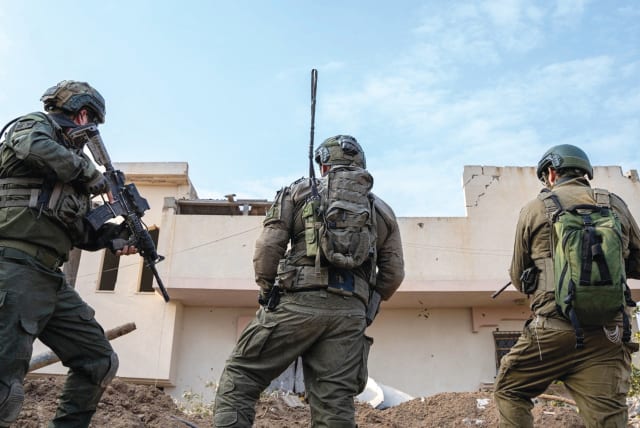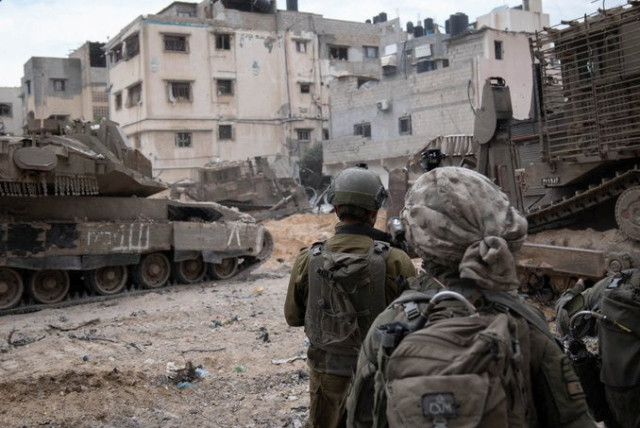Beginning of the end? Still a long way to go before Israel's goals be attained

It must be clear that though this may be the beginning of the end there is still a long way to go before all or most of Israel's goals will be attained.
"Israel’s ground offensive in Gaza thus far has been a significant success, not only tactically, but also strategically, deterring Hezbollah in Lebanon and other potential aggressors.” This is what I was recently told by a senior American strategic expert – who added that “the heavy bombing and shelling by Israel was an integral part of this success since when Hezbollah leaders see the extent of the destruction in Gaza, they cannot ignore what would happen to them too.”
Nor has the determination and efficiency of the IDF escaped the attention of Arab states that see Hamas and Islamic fundamentalism as threats to the stability of their own regimes – while their estimation of Israel’s military and technological capabilities has been further enhanced by their groundbreaking interception of an Iranian ballistic missile fired by the Houthis in Yemen, an event probably observed by Saudi Arabia and the United Arab Emirates, among others.
However, realistically adjudged, it must be clear that though this may be the beginning of the end there is still a long way to go before all or most of Israel’s goals, unless prematurely stopped, will be attained, nor can one disregard the complicated, often opposing political aspects of the war – not only in matters relating to our closest ally, the United States but also from the point of view of our enemies and of international players who use the images of the destruction – some genuine, some fake – as fodder for their anti-Israel stance.
Credibility of IDF's spokesperson been especially important
In this context, the credibility of the IDF’s spokesperson has been especially important.
As for the constraints in connection with Israel letting in humanitarian aid and fuel into the Gaza Strip, this should be seen through the prism of American support; although retired general and former national security adviser Giora Eiland has written: “This must be the first time in history that a combatant supplies his enemy with ammunition.” Indeed, every “humanitarian aid” shipment, each fuel tank, prolongs the war and potentially makes it more dangerous for Israel’s soldiers.
The US having pressed Israel to deliver the “aid” and the petrol without linking it to releasing the hostages by Hamas, makes it at least partly responsible for the hostages’ fate. In the US and sometimes in Israel questions are raised, some germane to the issue, some not, of Israel’s strategy in the fighting and especially for the “day after.” An example of this was a recent article by Daniel Byman in Foreign Affairs criticizing Israel’s supposedly “muddled strategy in Gaza,” although not going into detail in this respect, both for international and domestic reasons, is probably preferable.
Israel's strategy is quite clear
Israel’s strategy is actually quite clear: destroying Hamas’s military and organizational infrastructure; creating a buffer zone along the border of the Gaza Strip; installing a temporary military administration; and eventually establishing a local government body perhaps including mid-level officials from the Palestinian Authority and, if possible, representatives of Arab states having full diplomatic relations with Israel – but no less importantly, linking the military campaign with efforts to release the Israeli hostages.
Viewing the often violent demonstrations against Israel around the world, one could be forgiven for thinking that the whole world is against us, but as renowned Washington-based global affairs analyst Leon Hadar wrote in an article in Haaretz: “When the military campaign in Gaza enjoys the support of more than 50% of the American public, what should worry Israel is not hostility toward it or the support for Palestinians among parts of the progressive American Left; the pro-Palestinian demonstrations at American universities and large cities have diverted attention from the bigger picture, i.e. that Israel continues to enjoy broad American support... as long as Israel is fighting against the axis of evil of Hamas, Hezbollah and Iran, it will continue to enjoy the support of the White House and both parties on Capitol Hill...The average American citizen believes that the killing of civilians in Gaza is the price that must be paid to achieve these goals and to secure a clear victory, as Israel has promised to do.”
In other words, if Israel does not follow through with its military campaign to the very end, it could lose American support – because, as Hadar writes, “the Americans don’t like losers.”
Whether admitting it or not, Israel achieving its military goals against Hamas will be also important to the international community irrespective of the Israeli context, as Iran has developed a system of waging war by remote control and without its direct involvement, through operating proxy networks: Hamas in Gaza, Hezbollah in Lebanon, Kata’ib Hezbollah in Iraq, and the Houthis in Yemen – which it can employ anywhere in the world: in the Middle East, North America, and Europe, where hundreds of thousands of migrants from Islamic countries and hundreds of thousands of militant anti-Western demonstrators can be counted on to enlist, as they did for ISIS.
What is currently happening in the Red Sea and the Bab al-Mandab Strait is a tangible example of the operations of just such a proxy and of Iran’s ability to manufacture a global economic crisis. Unfortunately, it has also been so far an example of the international community’s hesitancy to deal with the problem – and although the US is endeavoring to set up an international maritime task force to combat maritime terrorism, at this stage, the scope of the force’s planned operations is not clear.
Furthermore, it should also be patently obvious that, without the willingness to carry out ground operations, the effectiveness of any international operation would be limited anyway.
The writer, a former MK, served as ambassador to the US from 1990-1993 and 1998-2000.
Jerusalem Post Store
`; document.getElementById("linkPremium").innerHTML = cont; var divWithLink = document.getElementById("premium-link"); if (divWithLink !== null && divWithLink !== 'undefined') { divWithLink.style.border = "solid 1px #cb0f3e"; divWithLink.style.textAlign = "center"; divWithLink.style.marginBottom = "15px"; divWithLink.style.marginTop = "15px"; divWithLink.style.width = "100%"; divWithLink.style.backgroundColor = "#122952"; divWithLink.style.color = "#ffffff"; divWithLink.style.lineHeight = "1.5"; } } (function (v, i) { });

